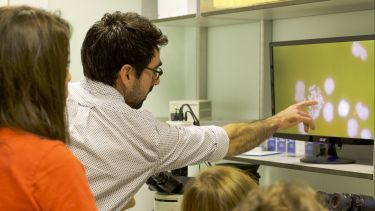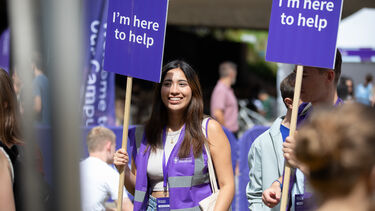Biosciences offer holder days
As part of your offer holder day at Sheffield, you'll be spending some quality time getting to know Biosciences and your chosen course.

Arriving at the school
You'll have booked to visit us 10am to 12.30pm or 2pm to 4.30pm on your offer holder day. Please arrive in good time for the start of your booked session, as we'll need to scan the QR code from your booking to register you.
Your arrival location is: Students’ Union Auditorium (East Entrance). You can view this on our interactive campus map, and there'll also be lots of open day staff and ambassadors around campus to help you.
If you arrive late for your booked session, please report to the general information stand on the Students’ Union concourse, where event staff will be able to help.
When booking, you'll be able to reserve a place for yourself and one guest at the school activities. To ensure safe venue capacities, the school will be unable to accommodate any additional unbooked visitors.
However, you're welcome to bring additional guests to accompany you on the day, and we would encourage these guests to take part in our range of central exhibitions and tours while the school activities are running.
Biosciences offer holder timetable
You'll have booked to visit the school 10am to 12.30pm or 2pm to 4.30pm on your offer holder day. Here's what to expect from your time with us. Timings are approximate and are subject to change, so we recommend checking back prior to the event.
Come and chat to us
In addition to the scheduled activity, you can visit our exhibition in Committee Central, Students' Union from 10am to 4.30pm. Here you'll find biosciences staff and current students who will be happy to answer your questions.
Timetable
| Duration | Student activity | Parent/supporter activity |
|---|---|---|
| 1 hour | Course talks in the Students’ Union Auditorium (East Entrance) | Course talks |
| 1.5 hours | Biosciences research experiences | Careers discussions followed by a school tour |
For the rest of the day, you'll have time to take part in the central tours and exhibitions detailed in our offer holder day guide.
Bioscience research experiences
You'll take part in two biosciences research experiences and go on a tour of our research and teaching facilities to give you a real taste of what it's like to be a student at Sheffield.
We'll match you to two activities aligned with your chosen degree to give you an insight into the types of laboratory practicals you'll encounter on your course. Experiences on our offer holder days are run by our researchers, teaching staff, and current students, giving you lots of opportunities to ask questions.
Here are some examples of what you could be doing on the day:
Genetic analysis of patient samples for cancer diagnosis
Learn how our students are trained to conduct genetic analysis of cancer patient samples that allow clinicians to make decisions about treatment. We’re working in partnership with Sheffield Children's Hospital NHS Foundation Trust, giving our students the opportunity to help NHS geneticists to diagnose blood cancers. Through this work our students directly tackle the global challenges of cancer and age-related human disease.
Forensic anatomy
Learn how biomedical science plays a key part in forensic anatomy. Examine anatomical models and hear more about state-of-the-art approaches you’ll use during your degree to understand human anatomy and physiological disease.
Imaging life in zebrafish
Learn more about our research using fish. See some transgenic, fluorescent fish embryos in our zebrafish pod, and discover how we can understand development and disease in both humans and animals.
Electrocardiogram
Measure electrical parameters of your own heart and try out our learning and teaching software. This software is used in our taught practicals, giving students step-by-step support that supplements the academic supervision at Sheffield.
Investigating photosynthesis through quantitative microscopy
Learn how to use imaging software to identify cell types in maize or rice leaves. You'll measure the sizes of specific cell types, compare these in maize and rice, and relate this to different mechanisms of photosynthesis. Through this process, you'll begin to understand the evolution of life, learn techniques that could be applied to all species, both plant and animal, and see why the biodiversity crisis is such a threat.
Cyanobacteria as the living model of synthetic biology
Study cyanobacteria to see the connection between chemistry and biological function. These organisms engineer the photosynthesis system to increase efficiency and capture wavelengths beyond the usual range.
Biodiversity in flight: evolution of bird wings
Measure the diversity in size and shape of a range of bird wings, and use your findings to identify the five basic designs dictated by the lifestyle and ecology of that species.
How ecosystems protect arctic permafrost from thawing
Test how different mosses and soils affect the thawing of ice. This activity will illustrate how the biological environment affects the thawing of Arctic permafrost in response to global warming. Through these approaches we see how the biosciences can tackle global challenges such as climate change.
Study of leaf structure through thermal imaging
Use thermal imaging to calculate leaf temperature and test the effects of mutations on the responses of plants to changing climate conditions.
Chromoprotein expression and regulation of bacterial growth
Several of our undergraduate students competed in an international competition to develop new biotechnology. They developed a system to control the speed of bacterial growth and introduce chromoproteins to create bacterial patterns in a range of colours. Participate in this work, generate your own results, and see how microbiomes can be altered to investigate the global challenges around genetic abnormalities.
Drosophila as a model organism
Visit our fly lab, see down the microscope and discover how our fly research is useful for understanding human health and disease and testing genetic variation. We'll tell you how we're using flies in our research at Sheffield and how you'll use them during your studies.
Parents and supporters tour
While you're taking part in activities, parents and supporters will receive a tour of the school and our facilities. They'll also get a chance to speak to current students and staff about the exciting opportunities that are available to you, and where a degree from Sheffield can lead.
How to book
Please book your place on the offer holder day via the link in your invitation email.
If you have any questions, please drop us an email to: myday@sheffield.ac.uk.

Visit us
Discover what sets Sheffield apart at an undergraduate open day this Autumn.
